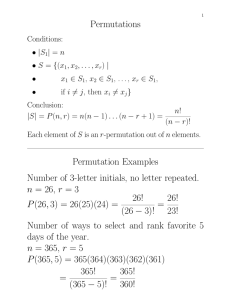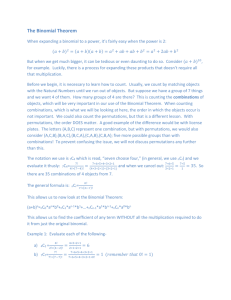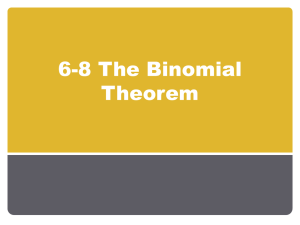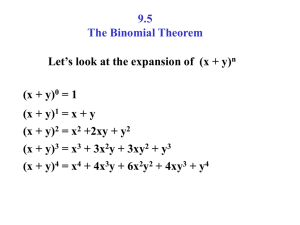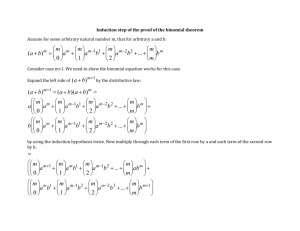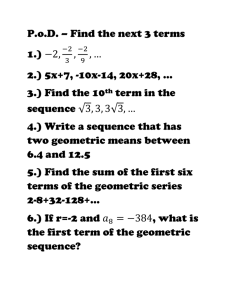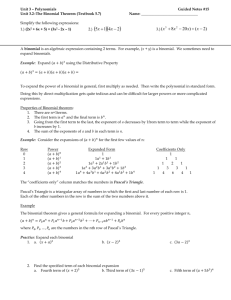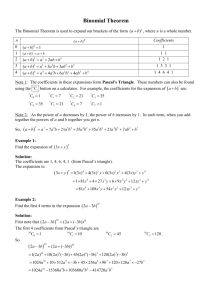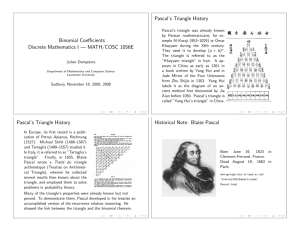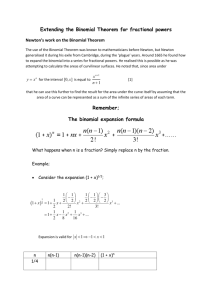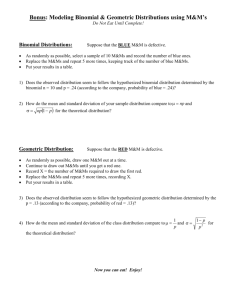Binomial theorem Notes
advertisement
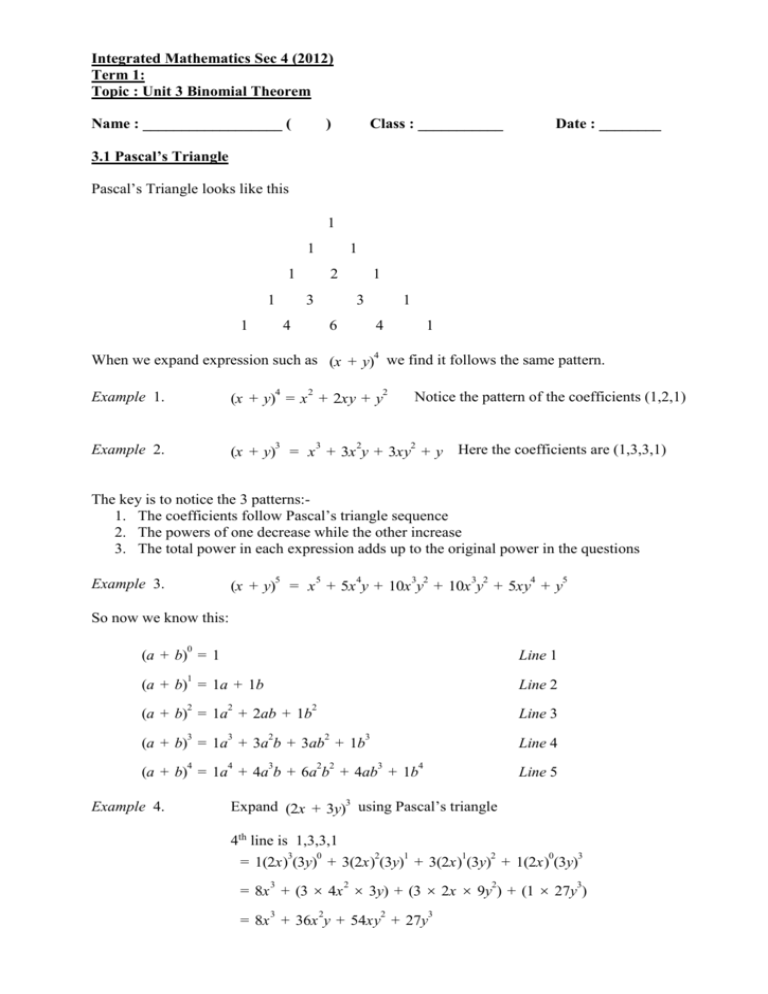
Integrated Mathematics Sec 4 (2012) Term 1: Topic : Unit 3 Binomial Theorem Name : __________________ ( ) Class : ___________ Date : ________ 3.1 Pascal’s Triangle Pascal’s Triangle looks like this 1 1 1 1 1 1 2 1 3 3 4 1 6 4 1 When we expand expression such as (x + y)4 we find it follows the same pattern. 4 2 2 Example 1. (x + y) = x + 2xy + y Notice the pattern of the coefficients (1,2,1) Example 2. 3 3 2 2 (x + y) = x + 3x y + 3xy + y Here the coefficients are (1,3,3,1) The key is to notice the 3 patterns:1. The coefficients follow Pascal’s triangle sequence 2. The powers of one decrease while the other increase 3. The total power in each expression adds up to the original power in the questions 5 Example 3. 5 4 3 2 3 2 4 5 (x + y) = x + 5x y + 10x y + 10x y + 5xy + y So now we know this: 0 Line 1 1 Line 2 (a + b) = 1 (a + b) = 1a + 1b 2 2 2 3 3 2 2 4 4 3 2 2 (a + b) = 1a + 2ab + 1b Line 3 3 (a + b) = 1a + 3a b + 3ab + 1b Line 4 3 4 (a + b) = 1a + 4a b + 6a b + 4ab + 1b Example 4. Line 5 Expand (2x + 3y)3 using Pascal’s triangle 4th line is 1,3,3,1 3 0 2 1 1 2 0 3 = 1(2x) (3y) + 3(2x) (3y) + 3(2x) (3y) + 1(2x) (3y) = 8x + (3 4x 3y) + (3 2x 9y ) + (1 27y ) 3 3 2 2 2 2 3 = 8x + 36x y + 54xy + 27y 3 Example 5. Fully expand (1 + 3x)(1 + 2x)3 3 3 0 2 1 1 2 0 3 (1 + 2x) = 1(1) (2x) + 3(1) (2x) + 3(1) (2x) + 1(1) (2x) 2 3 2 3 = 1 + 6x + 12x + 8x 3 2 3 (1 + 3x)(1 + 2x) = (1 + 3x)(1 + 6x + 12x + 8x ) 2 3 = 1 + 6x + 12x + 8x + 3x + 18x + 36x + 24x 2 3 = 1 + 9x + 30x + 44x + 24x 4 4 3.2 Factorial Notation n! = n (n – 1) (n – 2) ...... A factorial notation looks like this Example 1. 8! = 8 7 6 5 4 3 2 1 To find the number of ways of choosing r items from a group of n items is written as n n Cr or r This is calculated by Example 2. Find 5 n! r ! n r ! C3 = 5! 2! 3! = 54321 21324 = 120 26 = 10 Example 3. Find 7 4 = 7! 3! 4! = 7654321 3214321 = 35 Example 4. 4 people need to sit down but 2 want to sit together. How many different combinations are there? n Using 4 Cr = C2 = 4! 2!2! = 4321 2121 =6 3.3 The Connection between Combination Notation and Pascal’s Triangle Investigate these values : 4 4 C0 = 1 C1 = 4 4 4 C2 = 6 4 C3 = 4 C4 = 1 These values are the same as the Index 4 line 6th line would be 6 6 6 6 6 6 6 0 1 2 3 4 5 6 3.4 Using Factorial Notation to work out the Coefficients in the Binomial Expansion The Binomial Expansion is:n (a + b) = (a + b)(a + b)(a + b)........(a + b) n n 0 n n–1 1 = ( C0)a b + ( C1)a or Example 1. n n–2 2 b + ( C2)a n n–n n b + ...........( Cn)a b n n 0 n n–1 1 n n–2 2 n n–n n b + a b ........... a b a b + a 0 1 2 n Use the binomial theorem to find the expansion of (3 2 x)5 . 5 5 5 4 5 3 5 2 0 1 2 3 = 3 ( – 2x) + 3 ( – 2x) + 3 ( – 2x) + 3 ( – 2x) 0 1 2 3 5 1 5 0 4 5 + 3 ( – 2x) + 3 ( – 2x) 4 5 2 3 4 = 243 – 810x + 1080x – 720x + 240x – 32x 5 Example 2. x a) Write down the first 4 terms of the expansion 1 10 6 6 x = (1) – 10 0 0 6 5 x + (1) – 10 1 1 6 6 4 x + (1) – 10 2 2 6 3 x + (1) – 10 3 2 3 x x x = 1 + 6 + 15 + 20 – 10 100 1000 2 3 6x 15x 20x = 1 – + – 10 100 1000 2 = 1 – 0·6x + 0·15x – 0·02x 3 b) By substituting an appropriate value of x, find an approximate value to (0.99)6, giving answer to 5 d.p. This means we want x 1– = 0·99 10 0·01 = x 10 0·1 = x 2 3 substitute x = 0.1 into (1 – 0·6x + 0·15x – 0·02x ) = 1 – (0·6 0·1) + (0·15 0·1 ) – (0·02 0·1 ) 2 3 = 1 – 0·06 + 0·0015 – 0·00002 = 0·94148 6 Using a calculator 0·99 = 0·941480149 so approximation is accurate to 5dp as this how far the two answers are the same 3.5 Expanding Polynomials Using the Binomial Expansion You need to remember these facts… n n n n–1 1 n n–2 2 n (1 + x) = 1 + 1 x + 1 x .........etc 0 1 2 2 or = 1 + nx + 3 n(n – 1)x n(n – 1)(n – 2)x + ........etc 2! 3! 3 (1 + 2x) = 1 + (5 2x) + 5 Example 1. 2 5 4 (2x) + 3 5 4 3 (2x) 2! + 3! 2 5 5 4 3 2 (2x) 5 4 3 2 1 (2x) + 4! 5! 2 3 4 5 = 1 + 10x + (10 4x ) + (10 8x ) + (5 16x ) + (1 32x ) 2 3 4 = 1 + 10x + 40x + 80x + 80x + 32x 5 3.6 Taking Out the Common Factors The Binomial Expansion only works for (1 + x)n so sometimes you need to take out a factor first. 3 x (2 + x) = 2 1 + 2 3 x =2 1+ 2 3 3 Expand as normal Remember to multiply by this at the end 3.7 Finding a particular term in Binomial Expansion The (r+1) th term of the expansion of (a b)n is: n Tr 1 anr br r Example 1: Find the 6th term of (4x - 5)10. T6 T51 10 T6 (4 x)5 ( 5)5 5 T6 806400000 x 5 Homework : Text book Exercises Ex. 6.1 : Q1,Q2,Q4,Q5,Q7,Q9 Ex. 6.2 : Q3, Q4, Q5,Q6,Q7,Q10
